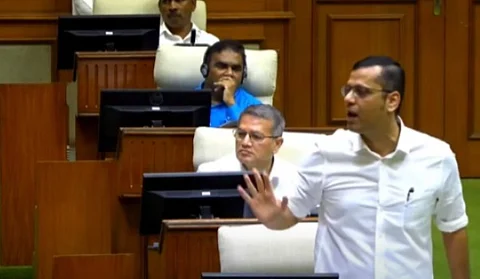

In a heated Assembly debate over alleged fraudulent alterations to the Survey Plan, the Opposition Leader made a striking rhetorical move, switching mid-speech from English or Konkani to Hindi. The shift carried clear symbolic weight, appearing to hint that those behind the alleged wrongdoing were not merely local actors, but influential figures from Delhi, the nation’s political nerve centre where Hindi dominates.
The change in language seemed aimed not only at grabbing attention inside the House, but also at sending a pointed signal to a wider, national audience, suggesting the web of influence extended well beyond Goa’s borders.
Delivering his pointed queries in Hindi, the Leader spoke with clarity and conviction. His diction bore a regional accent, and while not polished like a native speaker’s, his delivery was confident and easy to follow. On an informal scale, his fluency could be placed around 7 out of 10, more than sufficient to carry weight and drive home his message. The choice of Hindi, combined with his deliberate tone, gave the exchange a theatrical edge, amplifying the drama in the chamber.
The substance of his remarks only heightened the tension. He hinted at a political drama worthy of a thriller, alleging manipulation, conspiracy, and a deep network of corruption tied to the Survey Plan’s alterations. The Opposition sketched a picture of hidden hands, powerful interests, and quiet backroom manoeuvres, their accusations casting long shadows over the debate. The atmosphere in the House grew electric as legislators absorbed the gravity of the claims, the air thick with expectation and the sense that much more lay beneath the surface.